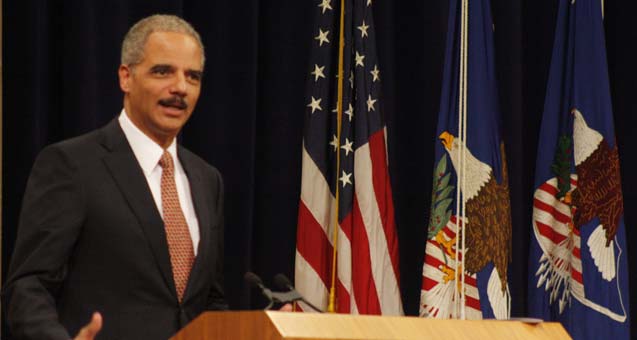
Honest, paywall-free news is rare. Please support our boldly independent journalism with a donation of any size.
Attorney General Eric Holder has ordered federal law enforcement agents to record all interrogations with suspects in custody.
The policy was outlined in a memo sent to the Federal Bureau of Investigation; the Drug Enforcement Administration; the Bureau of Alcohol, Tobacco, Firearms and Explosives; and the U.S. Marshals Service.
It comes at a time when the recording of interrogations has become increasingly widespread among state and local law enforcement as a means to prevent false confessions and coercion.
Currently, 18 states require interrogations to be taped, along with hundreds of local police departments and prosecutors around the country.
But the practice is not currently required by law in New York, where the failure to record interrogations has factored into several high-profile murder cases.
Last year, ProPublica published an in-depth examination of the case against Pedro Hernandez, a man currently awaiting trial for the murder and kidnapping of a 6-year-old Etan Patz. Patz famously vanished while walking to his school bus stop in Manhattan in 1979. Hernandez confessed to the crime 33 years later in 2012, following an hours-long, unrecorded interrogation.
His lawyers say Hernandez was manipulated into a false confession. They note that he exhibits many of the problems that might lead someone to confess to something he didn’t do: He has the IQ of a borderline retarded person, he is mentally-ill, and he confessed to a well-known crime, in which many of the facts are publicly known.
In January 2012, then New York Police Commissioner Ray Kelly and Manhattan District Attorney Cyrus Vance were members of a panel that called for mandatory taping in New York—but it hasn’t been uniformly adopted or required.
A spokesperson for the New York Police Department did not immediately respond to questions about its policy on recordings.
Holder’s new policy “establishes a presumption” that federal agents “will electronically record statements made by individuals in their custody.” But it also includes some caveats: recording is not required while someone is being transported to detention even if they’re being questioned during the trip, nor when suspects specifically request that they not be recorded, nor when questioning is “undertaken to gather national security-related intelligence.”
A terrifying moment. We appeal for your support.
In the last weeks, we have witnessed an authoritarian assault on communities in Minnesota and across the nation.
The need for truthful, grassroots reporting is urgent at this cataclysmic historical moment. Yet, Trump-aligned billionaires and other allies have taken over many legacy media outlets — the culmination of a decades-long campaign to place control of the narrative into the hands of the political right.
We refuse to let Trump’s blatant propaganda machine go unchecked. Untethered to corporate ownership or advertisers, Truthout remains fearless in our reporting and our determination to use journalism as a tool for justice.
But we need your help just to fund our basic expenses. Over 80 percent of Truthout’s funding comes from small individual donations from our community of readers, and over a third of our total budget is supported by recurring monthly donors.
Truthout’s fundraiser ended last night, and we fell just short of our goal. But your support still matters immensely. Whether you can make a small monthly donation or a larger one-time gift, Truthout only works with your help.